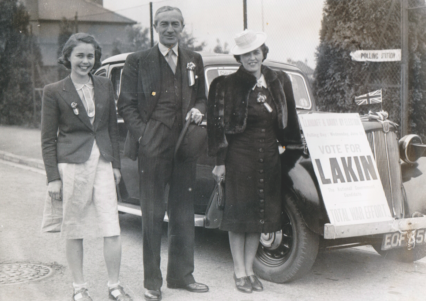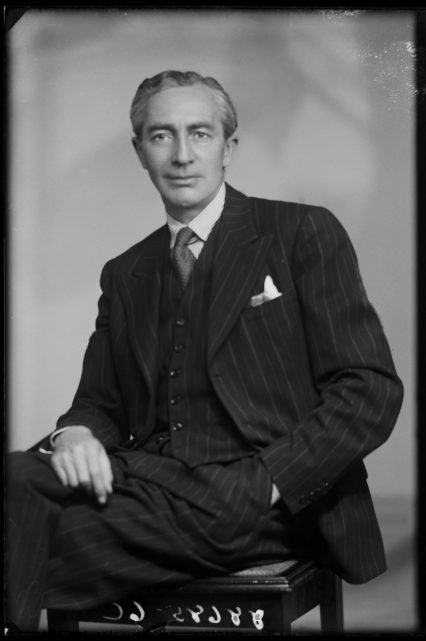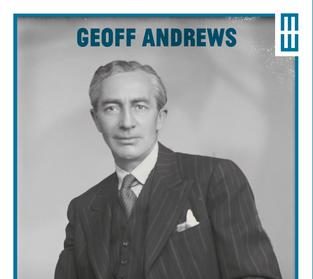Historian and biographer Geoff Andrews recounts the story of the Berry brothers – the Merthyr millionaire press barons who made waves in the early twentieth century.
The story of the Berry brothers from Merthyr Tydfil (William, Gomer and Seymour) has never been told in full, least of all in Wales. Starting off in Merthyr, where their father J.M. Berry had been the political agent of Liberal MP and coalowner DA Thomas (Lord Rhondda), they would all go on to become millionaires. Seymour built his wealth on the back of the South Wales coal industry, while as press barons his two younger brothers wielded as much influence during the interwar period as Lords Beaverbrook and Rothermere. It is a story of power, patronage, nepotism, and good fortune, with some unlikely outcomes. One of these is how they opened the pages of the Daily Telegraph and the Sunday Times to the literary world of the 1930s.
It was William, the middle brother, who was responsible for their rise in the newspaper industry. At the age of fourteen, after winning an essay competition organised by his local paper, the Merthyr Times, he was given a job as an apprentice reporter and office boy by W. W. Hadley, its editor. Forty years later he would reciprocate by making Hadley editor of the Sunday Times. His big break came when he launched his own periodical Advertising World, helped by an advance of £100.00 from Seymour Berry, who was on the road to becoming a powerful coalowner with numerous directorships. He brought his younger brother Gomer – then working as a floor walker in a Merthyr department store – to London to help him. An ideal partnership followed with William Berry looking after the journalism and editorial side and Gomer assuming responsibility for business matters, while Seymour remained a supportive financial backer. After selling Advertising World, the brothers purchased a series of smaller magazines including, in 1909, Boxing, increasing its circulation at a time when the sport was enjoying growing popularity from 100,000 to 250,000.

They made their first major purchase with the help of James White, a financier and former boxing promoter whom William Berry had once lent £500.00 to avoid possible bankruptcy. Over lunch at the National Liberal Club in 1915, White was able to repay Berry’s generosity by providing funds so that the brothers could carry off the acquisition of the Sunday Times for just £80,000. West de Wend Fenton, owner of The Sporting Times (‘The Pink’Un’), was sitting at a nearby table and informed them the paper was up for sale, partly because its main shareholder, Hermann Schmidt a German businessman, was being interned on the Isle of Man during the war.
At the Sunday Times, William Berry immediately took on the role of Editor-in-Chief, where he maintained a personal interest in the day-to-day business of publishing a newspaper. One of his innovations was to broaden its content by including more articles on literary matters to add to the material on finance and politics. In 1919 the brothers purchased the Financial Times and the St Clements Press and within two years had expanded again to incorporate Kelly’s Directories, the Daily Graphic, the Bystander and the Weekly Graphic, while assuming controlling interests in various Welsh newspapers, notably the Western Mail, but also the Cardiff Weekly, the Merthyr Express and the Pontypridd Observer. In early 1924, together with Sir E.M. Iliffe, a Midlands newspaper proprietor, the brothers set up a new company, Allied Newspapers Ltd., which enabled them to buy more regional papers. In 1926 they bought Amalgamated Press, the largest publisher of periodicals in the world from the estate of Lord Northcliffe and in December 1927 it was announced that William Berry, Gomer Berry and Sir Edward Iliffe had bought the Daily Telegraph from Lord Burnham. At the time of the take-over its sales were flagging, the building was crumbling, and new blood was needed in all departments. The Berrys transformed 135 Fleet Street (which the paper had occupied since 1882), with a new art deco design and a majestic colonnade façade, enhanced by the work of sculptor Samuel Rabinovitch. Inside, journalists and visitors were transported by high-speed American-style lifts which could reach the six floors in eight seconds. Original blue rubber floors and white Italian marble staircases greeted guests once they vacated the elevator. The imposing building was a statement of the power and influence of the Berrys as Fleet Street barons.
William Berry was constantly thinking about improving circulation and widening its appeal to an informed and educated readership. He knew that his childhood friend Lady Rhondda, who had inherited her father’s title and business interests, had used her wealth to successfully launch Time and Tide, a groundbreaking feminist literary review which encouraged new writing. He now sought to do the same. The man he asked to do this job was Cyril Lakin, a product of Barry, who after surviving the First World War was on a rapid rise through the hierarchy of the Welsh newspaper industry with the help of the Webber brothers at the Western Mail and David Davies, the owner of the Swansea Evening Post. Davies had recommended him to the Berrys, who made him their personal assistant before appointing him to a unique role as assistant editor and literary editor of both newspapers. They recognised Lakin’s flair for innovating and as a catalyst for new projects. In his work as assistant editor, he took responsibility for changing the layout of the paper and extending its editorial space.
But it was in his role as literary editor that he made his mark. Enjoying the freedom afforded him by the Berrys (by now ennobled as Lords Camrose and Kemsley), he cultivated a range of new talent, including many writers in the formative stage of their careers. In 1931 he enlisted Rebecca West, proudly described ahead of her first contribution ‘as the most brilliant woman literary critic of our day’. Already established as a journalist, critic and writer as well as a leading proponent of feminist causes, her eloquent, assertive, uncompromising style was admired for its depth of knowledge while she did not suffer fools or avoid contentious or controversial subjects. In early 1932 West’s attention switched to the threat posed by the spectre of totalitarianism, notably in the Soviet Union, describing it as a society where ‘emotional and intellectual life is entirely flattened out’. This set her apart from many of the left-wing intellectuals still intoxicated by the Red Paradise.

West had a profound influence on Lakin and was crucial in his plan to broaden the appeal of the Daily Telegraph, which was still conservative in much of its outlook. She relished the freedom ascribed to her in the pages of the newspaper and regarded him as one of the ‘wisest’ bosses she had ever written for. Lakin was partly in awe of her, but at the same time understood the importance of nurturing the talent he now had at his disposal. He built on this promising opening, and over time would edit a host of other leading writers, among them Dorothy L. Sayers, Desmond MacCarthy, Harold Nicolson, and Robert and Sylvia Lynd. As a kind of literary impresario, he hosted the annual Sunday Times Book Exhibition for many years and dined regularly with agents and publishers (including Victor Gollancz).
In 1935 Lakin made a double swoop for two writers coming into their prime. In the Tuesday slot he recruited Cyril Connolly and on Fridays Cecil Day Lewis, a leading poet of the new generation. It was the high point of detective fiction and Connolly’s selections of crime thrillers with a twist were particularly noticeable, at a time when the detective story had become not only a popular genre, but one through which relations between classes, the fragility of familial bonds, burning social questions and international conflicts could all be examined.
C. Day Lewis, who was himself writing detective stories under the pseudonym Nicholas Blake while he was reviewing new fiction for the Telegraph, was Lakin’s best reviewer. Intriguingly, Day Lewis was then in his communist phase, speaking occasionally at Communist Party public gatherings, attending international writers’ congresses and hosting branch meetings at his cottage in Cheltenham. From late 1935 he had his post opened, and his activities reported on by the police constabulary in memos to MI5, Britain’s security service. Yet any dogmatism implied by his intention to produce a ‘communist guide to literature’, was singularly absent from his Telegraph contributions. Here he surveyed a whole range of new writing in lucid prose and perceptive criticism. ‘I think that Day Lewis is easily the best reviewer of novels I have come across in the last few years’, Lakin told Arthur Watson, editor of the Daily Telegraph. ‘On the other hand, I do not know how far his communist views are going to land him. Up to the present there has been no sign of propaganda in his reviews. I have only seen one letter from a reader asking whether he and the communist writer are the same.’
At the Sunday Times in 1936, Lakin had a hand in promoting the work of another poet and one of his fellow-countryman. After publishing his first verse in literary magazines in his late teens, by the age of twenty-two Dylan Thomas was beginning to win the admiration of notable critics. The poet and literary hostess Edith Sitwell eagerly championed this new talent and suggested a review to Lakin, convincing him that Thomas’s new Twenty-Five Poems demonstrated his outstanding potential. Her review was an announcement of a new talent, praising the ‘huge scale’ of his ‘magnificent’ work, its ‘superb’ form, theme, and structure. She ended her review by heaping more praise on the young Welshman. ‘I could not name one poet of this, the younger generation, who shows so great a promise, and even so great an achievement’.
Her review produced one of Lakin’s biggest postbags at the Sunday Times with indignant correspondents brought up on Victorian poetry denouncing its ‘obscurantist’ modernism, and even whether the work of ‘Miss Sitwell’s poet’ should be considered serious verse at all. The letters pages debated Thomas’s merits, and finally from Sitwell in Paris there came a staunch defence. He ‘is a poet and a very fine one’, she responded, curtly dismissing the objections of one contributor. ‘When Mr Thomas and I want to be taught our job by somebody who writes in the “Poetry Review” we will make the request. I would as soon ask a writer in the “Poultry Gazette” to teach me to train eagles to fly’.
At the end of 1936, Camrose and Kemsley divided their ownership, with the former taking sole control of the Daily Telegraph, leaving the latter in charge at the Sunday Times. Lakin thought it would be less stressful to work on a weekly and so stayed with the Sunday Times (he still had ambitions to be its editor). Initially it was a fateful decision which led to him accompanying Kemsley on an ill-fated appeasement mission to meet Hitler, though subsequently it freed him to become a broadcaster and wartime MP for his hometown.
Geoff Andrews is Senior Lecturer in Politics at The Open University. His new book, Smooth Operator: The Life and Times of Cyril Lakin, Editor, Broadcaster and Politician has just been published by Parthian in its Modern Wales series.












